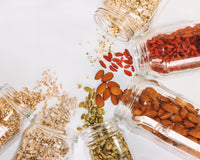We’ve all seen Popeye devouring spinach as if his life depends on it when he needs some serious muscle quickly, but have you ever considered why? Here at WholeFood Earth, we believe that Popeye was just incredibly health-aware and realised that he needed some magnesium for optimal performance. Spinach contains a relatively large amount of magnesium, and this seems to be the quick-fix that Popeye needed.
Thankfully here at WholeFood Earth, we are a tad more innovative when it comes to nutrients and how to get enough of them in your diet, and we have found a great alternative to canned spinach in the form of sparkling water.
Donat Mg is a natural mineral water which contains large amounts of magnesium. It has been used in its native Slovenia for years as a cure to various conditions and as a natural way to boost health and immune systems. It has also been proven to relieve constipation, and people who have been drinking it for years swear to its effectiveness. In this article, we’ll tell you exactly why you need magnesium, and how to get enough of it.
Why do we need Magnesium?
Magnesium is one of the many minerals that our bodies need to thrive, and yet it’s often overlooked. One of the reasons that a magnesium deficiency is often not recognised is because the symptoms closely resemble symptoms of other illnesses or conditions, it could even be mistaken with the common flu.
Among other things, magnesium helps the body regulate and stabilise muscle function, nerve function, blood sugar levels, blood pressure, and it helps the body make protein. It’s also said to help improve (in)digestion issues. These should be reason enough to make you re-evaluate your magnesium intake, and make amendments if you are falling short of the daily recommended intake.
Who knows, that fatigue you inexplicably feel after an easy day could perhaps be cured by making some simple amendments to your diet!
What is Magnesium Deficiency and What are the Symptoms?
Magnesium deficiency is often overlooked, especially if it is only a mild deficiency. Symptoms of mild magnesium deficiency include nausea, fatigue, vomiting, weakness, and a decreased appetite.
The symptoms of a mild deficiency are often not associated with magnesium intake and are instead often attributed to stress, an oncoming flu, and, for the really creative, even the weather.
It is important to keep an eye on your magnesium intake, however, as a more severe or long term deficiency could have much more serious consequences. The symptoms of the more severe cases include numbness, tingling, muscle cramps, and sometimes even seizures, abnormal heart rhythms, and even personality changes. Reason enough to stay alert and make sure you integrate enough of these vital nutrients into your diet.
Who is Most Prone to Magnesium Deficiency?
Though magnesium deficiency affects many, there are a few groups who are more at risk. Persons with blood sugar abnormalities, people with gastrointestinal issues, people who are alcohol dependent, and many older people are affected due to their general lesser absorption capacities which lead to fewer minerals being absorbed. This means that people with these conditions could be consuming the required daily intake, but still end up being magnesium deficient! Especially people who suffer from gastrointestinal conditions could greatly benefit from implementing Magnesium into their diet.
Donat Mg Magnesium Water has proven in a recent clinical study to be effective in stimulating digestion and helping people get in control of their gastrointestinal issues.
How can we get More Magnesium in our Diets and What are the Typical Sources of Magnesium?
Magnesium is present in a wide variety of foods such as spinach, nuts, and wholemeal products. People do, however, need quite significant amounts of magnesium and therefore would need to consume considerable quantities of spinach to get our daily recommended serving.
With a really well-balanced diet based on magnesium intake, it would be possible to get the daily recommended dosage. Nevertheless, research has proven that this is simply not realistic for most people. You’d likely turn green before you reach the necessary amount of spinach required for a sufficient magnesium intake, and getting enough magnesium through eating large quantities of nuts is tricky due to the high-calorie count.
People simply do not have the time, energy, or Popeye’s willpower, to inhale several cans of spinach on a daily basis, let alone to calculate their nutrient intake to the milligram. An easy and tasty alternative, such as Donat Mg Magnesium Water is, therefore, a blessing. A tasty addition to your lunch, the content of just one bottle meets the daily recommended intake, has zero calories, and has a range of other health benefits such as improving (in)digestion.






